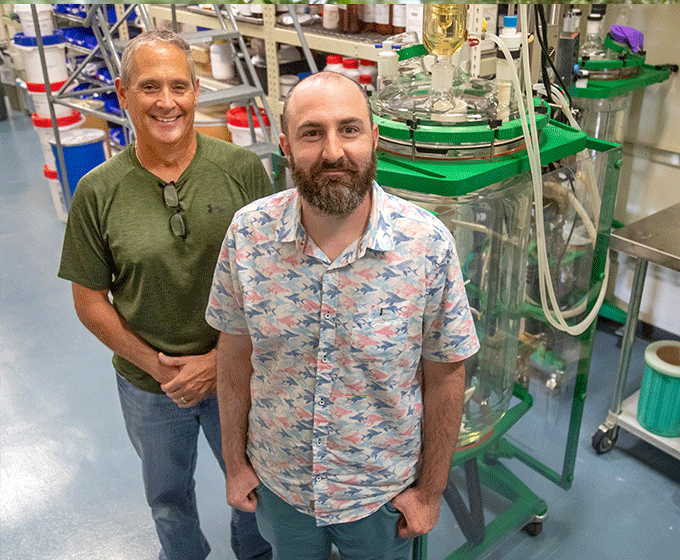
“SwRI and UTSA will work together to combat the growing threat antimicrobial resistance poses to global health by developing a proof-of-concept platform to potentially create a whole library of new antibiotics,” said Shawn Blumberg, a lead scientist in SwRI’s Chemistry and Chemical Engineering Division and co-principal investigator (co-PI) of the project.
The World Health Organization (WHO) estimates antimicrobial resistance (AMR) is either a direct cause or a contributing factor in millions of deaths worldwide each year. The crisis is exacerbated by what WHO calls “an antibiotics pipeline and access crisis.”
Blumberg and his co-PI, Stanton F. McHardy, associate professor in the UTSA College of Sciences, will focus on creating a pipeline of new polycyclic antibiotics. This class of antibiotics includes tetracyclines, commonly used to treat pneumonia; anthracyclines, used to fight a cancer; and polycyclic xanthones, natural compounds with known health benefits.
“Polycyclic xanthones offer a variety of potential therapeutic applications, but they haven't been assessed yet,” said McHardy. “With the new synthesis process, we’re hoping to rapidly access a unique class of chemical building blocks, structural analogs and new compounds.”
The team plans to use the process to discover more effective tetracycline antibiotics and safer anthracycline treatments with fewer side effects. Blumberg and McHardy also hope to create synthetic polycyclic xanthones that can mimic natural analogues while delivering new mechanisms of action, or new ways of fighting infections.
To achieve their goals, Blumberg and McHardy say they’ll tap into the unique reactivity of dendralenes, which are chemical compounds used to “glue” molecular fragments together in a single step. Their goal is to rapidly explore and discover new treatments while improving or finding new techniques to tweak the structure of existing antibiotics to improve safety, reverse resistance and combat AMR worldwide.
“I like to think of it as a relay race,” said Blumberg, “SwRI will procure and synthesize advanced starting materials to deliver to UTSA. Then Dr. McHardy and his team will screen those materials to identify optimal conditions for achieving our desired chemical outcome. With those findings, SwRI will begin to synthesize additional materials until the molecular fragments are stitched together as designed.”
The project will run through July of 2025.
UTSA Today is produced by University Communications and Marketing, the official news source of The University of Texas at San Antonio. Send your feedback to news@utsa.edu. Keep up-to-date on UTSA news by visiting UTSA Today. Connect with UTSA online at Facebook, Twitter, Youtube and Instagram.
After getting your student settled in their room, connect with other UTSA families at our Family Get Together. Attendees need to RSVP for the event.
Rock & Brews Restaurant - 5702 Landmark Pkwy, San Antonio, TX 78249Late Night at the Rec is an awesome UTSA tradition that turns a typical information session into an exciting night of fun. It's a unique opportunity to meet new people and reconnect with old friends.
Campus RecreationCheer on the UTSA Soccer team as they take on Lamar in the first home game of the season.
Park West FieldShow your UTSA pride with our spirited crew—Rowdy, Cheer, the Spirits of the Roadrunner, and the incredible Spirit of San Antonio Marching Band (SOSA)—as we light up the night in true Roadrunner style.
Main Campus East Lawn, Main CampusAnnual Giving will host a First Day of School celebration to welcome students back to campus. We will have giveaways and photo opportunities.
Sombrilla Plaza, Main CampusEnjoy snacks while connecting with Adobe reps and student ambassadors. Download or log into the Adobe Express app to snag swag and unlock exclusive back-to-school templates. It’s a fun, fast way to get creative and start the school year with bold moves.
Central Plaza, Main CampusCelebrate the merger of UTSA and UT Health San Antonio with a pop-up featuring free t-shirts, exclusive swag, and interactive photo opportunities. Open to all students, faculty and staff. Supplies are limited!
Sombrilla Plaza, Main CampusThe University of Texas at San Antonio is dedicated to the advancement of knowledge through research and discovery, teaching and learning, community engagement and public service. As an institution of access and excellence, UTSA embraces multicultural traditions and serves as a center for intellectual and creative resources as well as a catalyst for socioeconomic development and the commercialization of intellectual property - for Texas, the nation and the world.
To be a premier public research university, providing access to educational excellence and preparing citizen leaders for the global environment.
We encourage an environment of dialogue and discovery, where integrity, excellence, respect, collaboration and innovation are fostered.